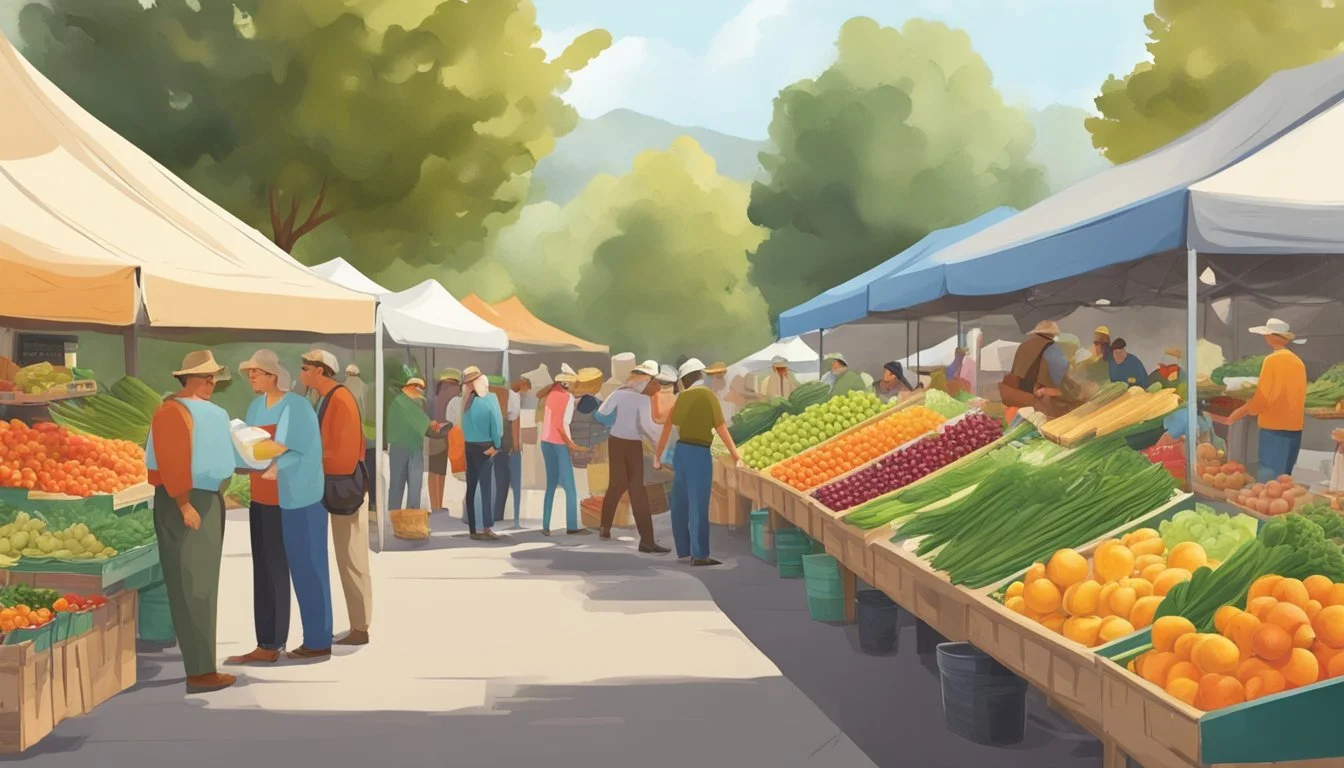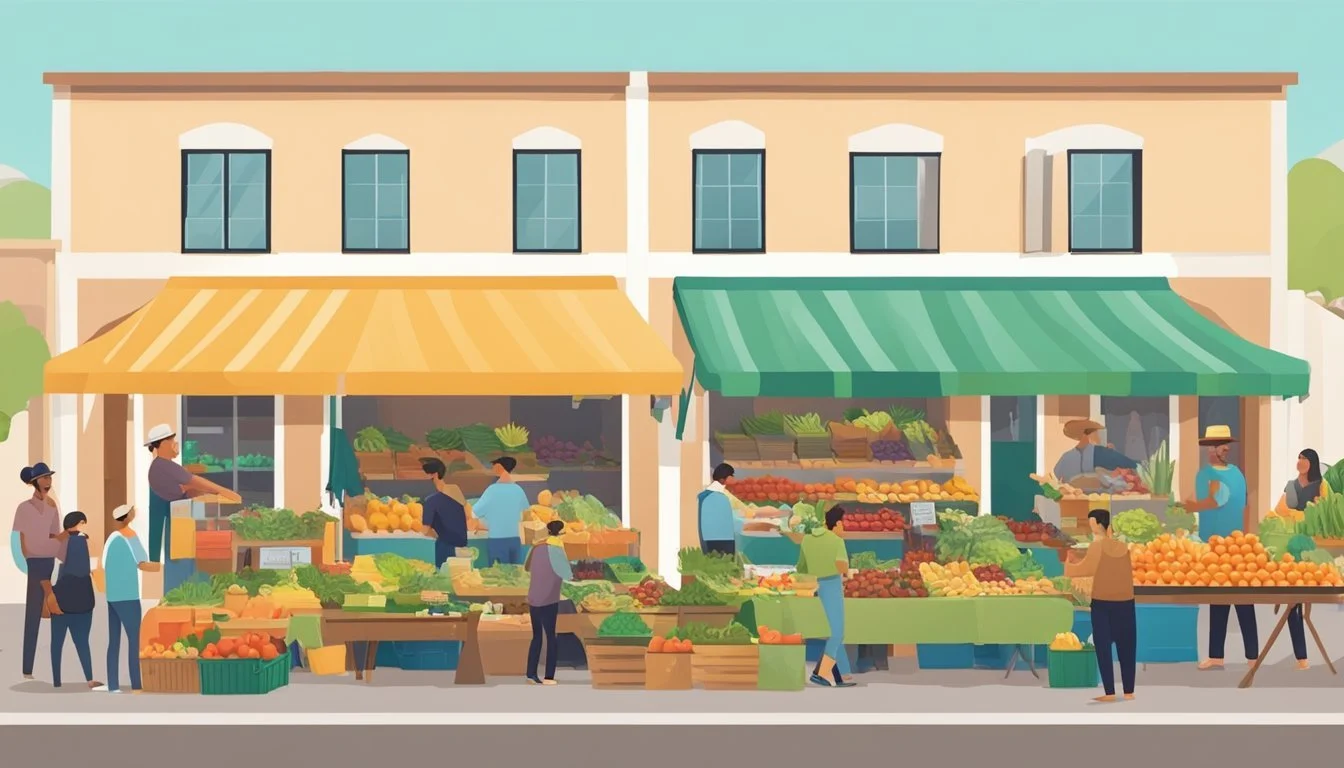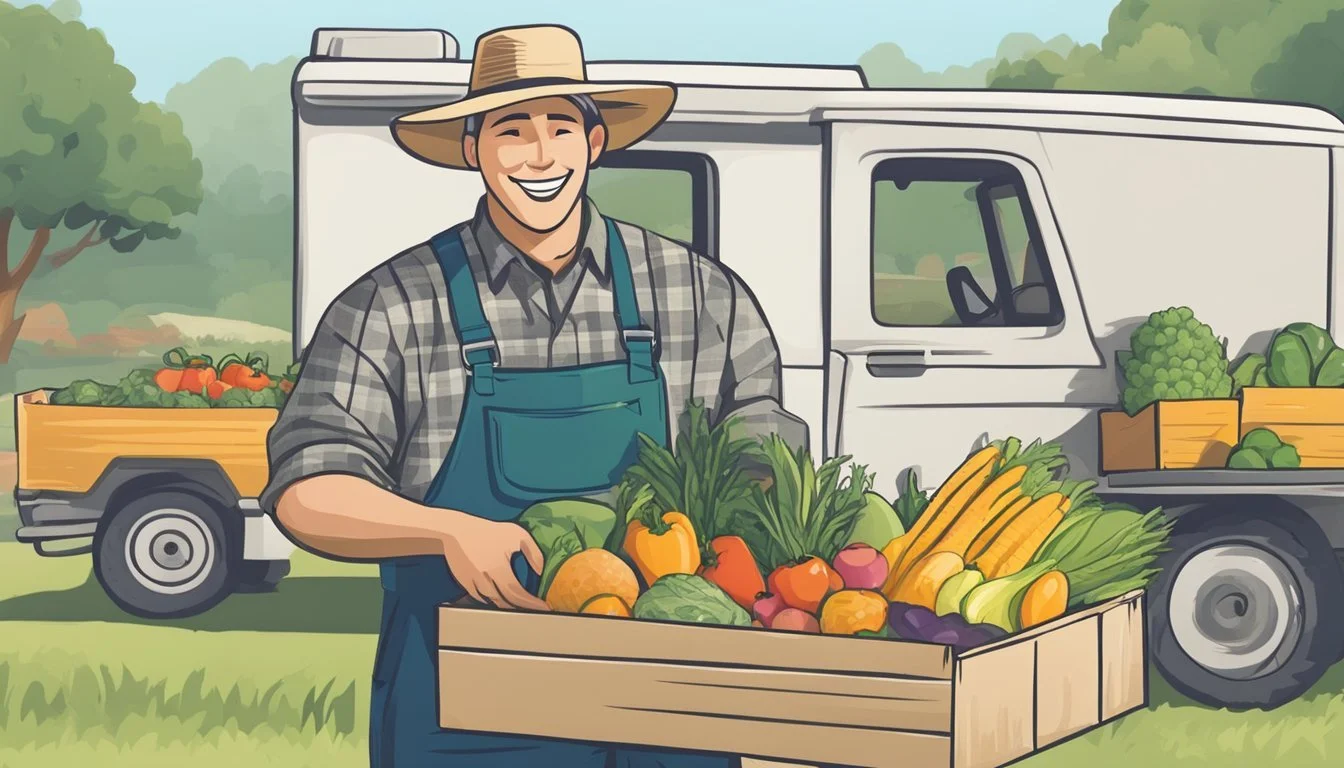Community Supported Agriculture (CSA) in Modesto, CA
A Guide to Local Farm Shares
Community Supported Agriculture, commonly known as CSA, establishes a direct partnership between local farmers and consumers. In the city of Modesto, California, this model is embraced as a sustainable way to secure a share of fresh, locally-grown produce. By purchasing a share from a CSA, Modesto residents invest in local farms, receiving a regular supply of seasonal food items throughout the farming season. This arrangement not only supports the agricultural economy of the Modesto region but also promotes healthier food choices and a deeper connection to the source of one’s food.
The essence of the CSA model lies in a simple commitment: consumers pay for seasonal produce upfront, which provides the farms with the necessary capital at the onset of the growing season. In return, members get to enjoy a variety of fruits and vegetables, and in some instances, additional farm products such as eggs or honey. Farms in and around Modesto utilize organic and natural farming methods, often employing drip irrigation and abstaining from using pesticides, herbicides, and chemical fertilizers. This commitment to sustainable practices addresses environmental concerns and assures consumers of the quality of their food.
Moreover, the CSA framework in Modesto extends beyond the weekly deliveries. It embodies a form of agricultural and social investment that nourishes community health and fosters relationships between farmers and consumers. By participating in CSAs, Modesto residents play a vital role in maintaining the vibrancy of local farms, ensuring that they continue to be a cornerstone of the region’s heritage and economy.
CSA Fundamentals
This section explains the concept of Community Supported Agriculture, traces its origins in California, outlines various CSA models, and discusses the role of CSA in enhancing local food systems.
Defining CSA
Community Supported Agriculture (CSA) is a system where consumers purchase shares or subscriptions from local farms. In turn, they receive regular distributions of the farm's produce throughout the growing season. This model provides farmers with a direct market for their products, while members enjoy fresh, local food.
The Origins and History of CSA in California
California has a rich history with CSA, where it has flourished due to the state's diverse agricultural output and the growing interest in sustainable farming practices. The concept emerged in the 1980s as a response to the need for closer connections between farmers and consumers.
CSA Models
There are several CSA models in operation:
Traditional CSA: Members pay for the season upfront, sharing the risks and benefits with the farmer.
Market-Style CSA: Members choose their produce, similar to shopping at a farmer's market.
Boxed CSA: Pre-packed boxes are delivered to members or picked up at designated locations.
Each model aims to distribute fresh, seasonal food directly from farmers to consumers.
The Role of CSA in Local Food Systems
CSAs play a crucial role in strengthening local food systems by ensuring consumers have access to high-quality, nutritious produce. They support California's agricultural community by providing financial stability for farms and fostering an ethic of sustainability and stewardship.
By participating in a CSA program, consumers invest directly in their health and their local community's economic vitality, contributing to a resilient food ecosystem.
Benefits of Joining a CSA
Community Supported Agriculture (CSA) offers Modesto residents an opportunity to receive high-quality, fresh produce while fostering economic growth and community ties. These are some of the standout benefits for individuals who join a CSA.
Fresh and Quality Produce
When people become CSA members, they regularly receive freshly harvested produce. This produce is often organic, which means it is grown without synthetic pesticides and fertilizers, ensuring a high standard of quality. The proximity of local farms also means that fruits and vegetables are seasonal, picked at their peak flavor and nutritional value.
Supporting Local Economy
Joining a CSA contributes directly to the local economy of Modesto. The funds from CSA memberships infuse capital into local farms, helping them sustain operations and thrive. This supports not just the farmers but also stimulates employment and promotes economic resilience in the community.
Enhancing Community Relationships
Participation in a CSA bridges the gap between residents and farmers, enhancing community relationships. Members often meet the individuals who grow their food, creating a sense of connection and mutual support. This engagement builds a stronger, more cohesive community where people are vested in the health and well-being of one another.
How to Join a CSA
Joining a Community Supported Agriculture (CSA) program in Modesto, CA, provides individuals with a way to directly support local farmers while receiving a regular supply of fresh, seasonal produce. To become a member, one must select a suitable CSA, understand the membership and share details, and follow the subscription process.
Choosing the Right CSA
When considering a CSA, potential members should research which farms offer CSA programs near Modesto, CA. Look for farms like Nourish Farm that prioritize ecological and sustainable farming practices. Assess the variety of produce and ensure that offerings like non-GMO, organic, heirloom, and specialty varieties align with preferences. Additionally, one should consider the pickup or delivery options and their convenience.
Understanding Membership and Shares
Membership to a CSA involves purchasing a "share" of the farm's harvest. It represents a commitment to supporting the farm throughout the growing season and sharing in the risks and rewards of agricultural production. A share typically includes a box of diverse, seasonal crops delivered or picked up at scheduled times.
Subscription Process
To subscribe to a CSA, interested individuals must:
Register with the chosen farm: Complete any necessary forms and agreements the CSA program requires.
Select a share type and size: Decide the amount of produce that suits one's needs. Some CSAs offer various sizes or options for shared, individual, or family consumption.
Choose pickup/delivery method: Members must decide where and how they will receive their CSA shares, whether through designated pickup locations or delivery services.
Payment: Pay the subscription fee to secure membership. This fee varies based on the CSA program's share size and season duration.
By following these steps, one can efficiently join a CSA and start enjoying fresh, locally-sourced produce.
Challenges and Considerations
Community Supported Agriculture in Modesto, CA faces a complex set of challenges that require careful consideration. These challenges span environmental unpredictability, economic pressures, and the intrinsic responsibilities associated with CSA models.
Weather and Crop Variability
Weather plays a pivotal role in the success of agricultural endeavors. Modesto faces variable climate conditions which can lead to unpredictability in crop yields. Factors such as droughts and temperature fluctuations can significantly impact farming, making sustainable farming practices essential to mitigate risk and ensure a reliable harvest.
Drought Risk: High likelihood in Central California
Temperature: Can vary widely; frost events to extreme heat
Crop Adaptability: Selection of resilient crop varieties is key
Water Usage: Implementation of efficient irrigation methods
Economic Factors
The economy influences the viability of CSA farms by affecting both operational costs and consumer purchasing power. Economic sustainability is paramount, and CSAs must navigate:
Cost Management: Balancing investment in sustainable practices with affordability
Market Prices: Competing with larger, conventional agrifood systems
Membership Fees: Structuring to cover costs while remaining attractive to consumers
Commitment and Responsibilities
CSA is not just an economic exchange; it's a partnership where responsibility is shared. Farmers must maintain transparent communication with members regarding the realities of farm operations, while members must commit to the model, accepting both the bounty and shortages that come with shared risk.
Farmer Commitment: Upholding sustainable and ethical farming practices
Member Commitment: Understanding and accepting the seasonality and variability of agriculture
Shared Risks: Weather impacts, crop failures, or unexpected expenses
CSA's Role in Sustainable Agriculture
Community Supported Agriculture in Modesto, CA, connects consumers directly to their food sources, fostering sustainable farming practices and reducing the carbon footprint. It encourages regenerative farming, provides educational opportunities for community members, and engages them in agricultural activities.
Environmental Benefits
CSA programs significantly reduce the number of miles food travels from farm to table, directly diminishing the carbon footprint associated with transportation. By focusing on local distribution, CSA farms around Modesto typically use less packaging, thereby reducing waste and the demand for energy-intensive materials.
Local Production: Food is grown and consumed within the community.
Packaging: Minimal use, focusing on reusable or biodegradable options.
Promoting Regenerative Farming Practices
Regenerative farming practices are at the heart of many CSA operations. These practices not only maintain soil health but actively improve it by increasing soil biodiversity and organic matter. Such methods underpinning sustainable farming include:
Crop rotation
Cover cropping
Organic pest management
Community and Educational Outreach
CSAs provide a unique platform for education on sustainable agriculture, not just through distribution but through member involvement and community outreach. They offer hands-on learning experiences about where food comes from and how it's grown, reinforcing the community's connection to the land and their food.
Workshops: Topics on sustainable farming practices and food preparation.
Volunteering: Opportunities for individuals to work on farms and learn directly.
By fostering a local, environmentally aware food system, CSAs in Modesto play a crucial role in shaping a more sustainable future.
CSA Products and Offerings
Community Supported Agriculture in Modesto offers a diverse range of products. Customers can expect seasonal produce, dairy, and unique heirloom varieties directly from local farms. The offerings in Modesto embrace the region's rich agricultural heritage and support sustainable farming practices.
Standard CSA Box Contents
The standard CSA box typically includes a collection of fresh vegetables such as tomatoes, leafy greens, and root vegetables that vary by the week depending on the season. Many farms also incorporate fruits like berries, apples, and citrus when available. A box is designed to supply an individual or family with a week's worth of produce.
Beyond Vegetables: Additional Farm Products
CSAs in Modesto often extend their offerings beyond vegetables to include other farm fresh products:
Eggs: Often available as an add-on or part of a deluxe box.
Meat: Locally raised meats such as chicken, beef, or pork may be offered.
Cheese: Artisanal cheeses from local dairies can be included.
Flowers: Seasonal bouquets add beauty to the bounty.
Specialty and Heirloom Varieties
Farms take pride in offering specialty and heirloom varieties that are not commonly found in traditional markets. These may include:
Tomatoes: Brandywine, Cherokee Purple
Peppers: Jimmy Nardello, Shishito
Squash: Delicata, Kabocha
Heirloom varieties are celebrated for their unique flavors and are often grown using traditional techniques.
Managing a CSA Farm
Effective management of a Community Supported Agriculture (CSA) farm in Modesto, CA involves meticulous planning in daily operations, establishing solid marketing strategies, and integrating technology for data management.
Daily Operations and Logistics
A farmer at a CSA farm begins their day with clear objectives, often using a drip irrigation system from their own well, eliminating the need for pesticides and chemicals. They plan honor system-based sales at their farm stands, ensuring fresh produce is available from dawn until dusk. Logistics involve updating inventory, coordinating delivery schedules, and maintaining crop health.
Daily Tasks Overview:
Water management: Leveraging drip irrigation systems.
Harvesting: Timely picking of produce for peak freshness.
Sales: Operating a self-serve produce stand with an honor system.
Marketing and Customer Relations
For farmers, direct marketing is key. They build relationships through transparency and community engagement. Farmers provide updates about available produce and share the stories behind their farming practices. The market manager is pivotal in developing these customer relationships, addressing inquiries, and retaining CSA members through consistent communication.
Marketing Channels:
On-site farm stand
Social media for updates and customer engagement.
Email newsletters featuring weekly CSA box contents.
Leveraging Technology and Data
Farmers increasingly use technological tools, such as CSA management software, to streamline operations. Data collected from sales can inform planting schedules and crop selection. Application Programming Interfaces (APIs) are also employed to integrate various systems, helping the farm to operate efficiently and be responsive to market demands.
Technology Utilization:
CSA management software: For inventory and member management.
Data analytics: To assess demand patterns and optimize crop yields.
APIs: To ensure systems update seamlessly for real-time information sharing.
CSA Community Engagement
Community Supported Agriculture (CSA) in Modesto fosters direct connections between farmers and community members. This engagement is vital to the sustainability of local agriculture and to strengthening community relationships.
Workshops and Farm Events
Local CSAs host a variety of workshops and farm events that serve to educate shareholders and the community about sustainable farming practices. These events often include tours of the farms, cooking demonstrations with seasonal produce, and discussions about the importance of organic farming methods. Through these gatherings, members not only learn but also experience firsthand the value of supporting local agriculture.
Volunteer Opportunities and Shareholder Workdays
CSAs thrive on the contributions of volunteers. Many farms offer volunteer opportunities and special workdays where shareholders can contribute to the farming efforts. These workdays foster a sense of community and enable shareholders to develop a deeper relationship with the land and the food they consume. Participants often take pride in the tangible results of their work, such as planting seedlings or harvesting produce.
Building a Community Network
At the heart of CSA is the network it builds between individuals and families who share similar values about food and community. By connecting with one another, shareholders foster a robust local food system and gain a stronger community presence. CSAs encourage community members to exchange ideas, recipes, and even the produce itself, reinforcing the communal bond and commitment to local agriculture.
Future of CSA in Modesto
The evolution of Community Supported Agriculture in Modesto is championed by the CSA Innovation Network and an increasing trend toward sustainable practices. Modesto stands to gain substantial advantages through tailored strategies and partnerships aimed at bolstering local agritourism.
Emerging Trends in CSA
The CSA landscape in Modesto reflects a shift toward sustainability and technology use. They are integrating research-driven practices to enhance crop yields and quality. Modesto's CSA programs are increasingly emphasizing organic and natural farming methods, as evidenced by small family farms like the Faust Family Farm. This drive aligns with consumer demand for fresh, locally-sourced foods without synthetic inputs.
Expansion and Innovation Strategies
CSA programs in Modesto are employing innovative strategies for expansion. They aim to extend their service offerings, including diversified crop selection and the incorporation of agritourism experiences. They are also tapping into digital tools for marketing and distribution, reflecting the broader CSA Innovation Network's push for modernization and efficiency in operations.
Collaborations and Partnerships
Collaboration is central for CSA models in Modesto, where the synergy between farmers and the community is pivotal. Partnerships with local businesses and institutions are enhancing CSA's market reach and financial stability. Participating farms are leveraging research and partner resources to ensure food safety and to broaden consumer education on the benefits of CSA participation.








